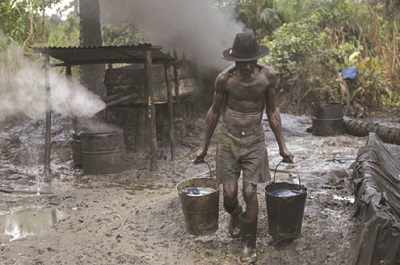
The current global economic crisis is the outcome of unjust exploitation by the capitalists and appropriation of the sweat of the working class and natural resources to themselves. It is within this context that the economic recession in Nigeria can be best put in perspective. A major cause of concern for socialist activists must be to unravel the dynamics of economic recession as it impacts on the working-class.
We must defend ourselves as the working class, because the bosses are not ready to concede the systemic shortcomings of their mode of production. This continually leads to busts, after the boom. During the booms the money bags see their luxury extended – during the busts they expect the working class to pay the consequences through austerity, retrenchments and pay cuts.
The pertinent question to ask is what is economic recession? For the hired servants of the capitalists, such as IMF and World Bank, the answers are simplistic. It is, they say, when the Gross Domestic Product (GDP) of a country declines for two successive quarters of a year. The current recession in the US and Europe arose from the careless gambling of the banks. This spread to China with declining demand for its goods and then to a crash in the price of oil.
While workers face downsizing, layoffs, wage freezes and pension cut-offs, capitalists do everything possible to increase their profit. What they tell the government to do is reduce funding on education, cut-off funding on health, privatize national assets, borrow more and open the economy to foreign direct investors.
While government claims to understand how bad the situation is for the poor, what we are offered is more failed promises. What they promise sounds good, but at best it is only available for a few. How many of us have actually benefited from increased employment, N5,000 a month for the indigent, good roads, health facilities, constant electricity power etc? To make matters worse, workers in several states are still owed months of salary arrears, while poor pensioners still wait for their meagre pensions.
We have also suffered huge price increases for electricity (whilst the ‘benefits’ of privatisation are still to come), kerosene (up from N50 to N500), rice and other basic food stuffs. As a result, our basic costs may have increased by 50% whilst in a number of states workers only received half their salaries last year. Despite this, the minimum wage and that for civil servants has not been increased for well over five years.
The global economic recession also impacts negatively on the working class in USA, Europe, Asia, Russia and other parts of Africa. The recession in Europe has led to unemployment for youths of 40% in some countries leading to the growth of fascist and far-right parties. In the US many workers are no better off than they were 30 or 40 years ago – this is reflected in support for Donald Trump. Poverty and unemployment in South Africa led to the xenophobic attacks on Nigerians and other workers from across Africa.
We should also remember that the recession in Nigeria is not a major event unlike the 1990s. The economy only shrank by an estimated 1.5% last year, whilst over the last three years the economy actually grew by nearly 6.5%. Inflation, officially of at least 10%, means that whilst most working class people are now significantly worse off than they were three years ago – whilst the bosses are significantly richer. Why does the recession and austerity always mean we have to suffer so the corrupt elite can become even richer?
If we look around, we can see that wealth is still available, at least for the corrupt elite. They still drive around in huge cars, with convoys for the politicians. They still live in huge villas and many have empty houses when many of us hardly have anywhere to call home. New buildings and businesses are still opening up.
Our trade unions are there to defend us. Why are they failing to act now? Why are the NLC and the TUC not leading a campaign of demonstrations and strikes to win a minimum wage of at least N56,000 a month? Why are the NLC and the TUC not organising general strikes against the huge hike in prices and the failure of many states to pay workers their due salaries?
We should not have to pay the cost for their recession. The NLC and the TUC have to act and say:
- No to austerity!
- A minimum wage of N56,000!
- Civil servants to receive their full salary entitlement!
by Adefolarin Olamilekan








